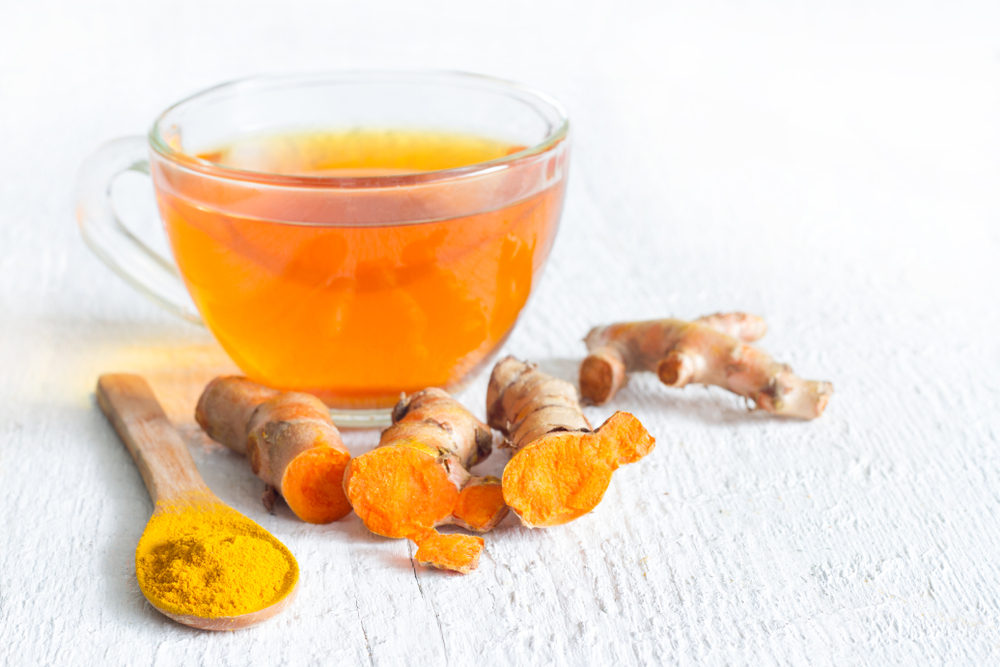Mythbuster: Turmeric Tea helps Improve Your Immunity

Turmeric is a flowering plant belonging to the Zingiberaceae family of plants (ginger family). Over thousands of years, people have used this herbal spice known for making tea from the rhizome stems, or its edible root system. In the Indian subcontinent, turmeric is also used extensively for cooking and also for spiritual practices. They provide many health benefits for which it was widely used in the ancient Indian health system Ayurveda.
Turmeric tea is made by soaking fresh or dried turmeric in water. It has a yellow, orange, or golden appearance and has an earthy flavor with a spicy zest (typical of ginger) that people often find bitter yet sweet. Turmeric tea can be easily made at home, or else most grocery shops and cafes sell packaged turmeric tea bags too.
Benefits of Turmeric Tea
People have used turmeric in Ayurveda for treating various conditions for hundreds of years. Scientists discovered a group of polyphenol antioxidants in turmeric called curcuminoids, which were responsible for the healing qualities of turmeric. According to researchers, the most potent curcuminoid is curcumin which has anti-inflammatory, antidiabetic, and antioxidant properties.
But there is no current evidence that states that turmeric tea has an equal effect as turmeric supplements which are induced with higher curcumin content. Moreover, our body is not capable of absorbing curcumin from turmeric very well, so the amount you acquire from consuming turmeric tea is quite less. Nonetheless, turmeric tea is a nutritious, delicious beverage that has healthy properties even if it does not cure any major issues for the time being.
Here is a list of potential benefits of turmeric tea:
1. Good source of some nutrients:
Þ Along with curcumin, other beneficial nutrients are also present in turmeric or turmeric tea such as Manganese, Iron, and Copper which are essential nutrients for healthy cell functioning.
2. Contains bioactive compounds:
Þ Bioactive compounds are nutrients that boost health in humans. These include all vitamins and minerals, as well as other necessary compounds such as polyphenols and volatile oils.
Þ Turmeric tea contains hundreds of these, including several volatile essential oils and different types of antioxidants, curcuminoids are known to be the largest group of bioactive compounds found in it.
3. Naturally low in calories:
Þ If the turmeric tea is not additionally prepared with milk or sweeteners, such as honey, usually 1 cup (237 mL) of turmeric tea potentially contains calories between 10 and 30, depending on the amount and type of turmeric you use [1].
Thus, one can replace other beverages like tea, soda etc with turmeric tea in their diet if you’re looking for ways to reduce calories;
a) A great bedtime tea:
Plain turmeric tea is caffeine free which is why it does not disrupt the sleep cycle even when you have it in the late afternoon or evening. However, turmeric tea which is blended with other types of green or black tea is caffeinated. Find a tea that is caffeine-free to enjoy turmeric tea without the jolt of caffeine.
b) Might promote heart health
Turmeric and curcumin are maybe helpful in maintaining proper heart functioning in more ways than one. Studies suggest that turmeric and curcumin supplements can lower blood pressure and levels of fat in the blood which can be both risky for heart disease when they are at higher levels [2, 3].
c) Another study states that turmeric and curcumin supplements had a role in reducing some blood fat levels, including LDL (bad) cholesterol and total triglycerides.
d) Could be great mood boosters:
Scientists are looking into the effects curcumin may have on depression and mood disorders. As the levels of curcumin content in turmeric tea are low, it won’t nearly make much of an impact, but the possibility of turmeric tea having some effect on mood is high. Although there are no hard proofs backing this up, a warm cup of tea can be mentally and physically soothing.
e) Works as a natural, plant-based dye:
Turmeric has a typical bright yellowish-orange color, which appears due to the presence of curcuminoids. Turmeric has extremely strong coloured pigments which means they tend to easily stain many materials, such as teeth, clothes, and countertops.
Conclusion:
Turmeric tea is generally safe for most people as long as it is consumed in moderation. However, certain groups of people should be cautious when using it or avoid it altogether. The correct amount of turmeric tea consumption during pregnancy and breastfeeding is currently unknown, so it is best to consume it in moderation during these periods. Some individuals may also experience allergic reactions to curcumin, which can manifest as skin irritation after handling or consuming turmeric. If you have had a similar experience, it is advisable to seek advice from a healthcare professional to learn more about the causes before drinking turmeric tea. If you are taking any medication, it is important to consult your doctor before consuming turmeric tea, as curcumin may interact with certain medications, such as blood thinners, antidepressants, antibiotics, and cancer drugs.






